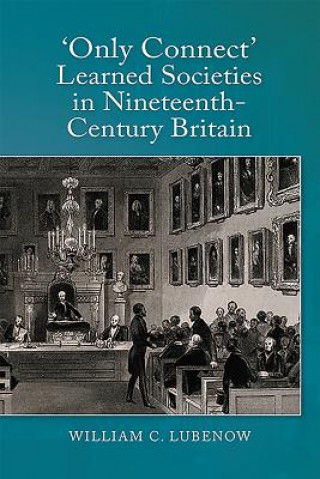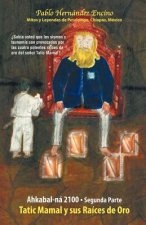
Kód: 09244590
Only Connect: Learned Societies in Nineteenth-Century Britain
Autor William .C. Lubenow
In the early modern period the subject of knowledge was dogma. Early modern knowledge was often tied to confessional tests and state-building. One road to modernity could be read as escape from institutional and confessional restr ... celý popis
- Jazyk:
 Angličtina
Angličtina - Vazba: Pevná
- Počet stran: 325
Nakladatelství: Boydell & Brewer Ltd, 2015
- Více informací o knize

Mohlo by se vám také líbit
-

Oblivionlore Volume I
324 Kč -

Poemas del Alma
860 Kč -

Ahkabal-N 2100. Segunda Parte
436 Kč -

Fundamentals of Christianity
720 Kč -

Fragile Gift of Love
452 Kč -

Addiction Proof Your Child
463 Kč -

Science and Democracy
5755 Kč
Dárkový poukaz: Radost zaručena
- Darujte poukaz v libovolné hodnotě a my se postaráme o zbytek.
- Poukaz se vztahuje na celou naši nabídku.
- Elektronický poukaz vytisknete z e-mailu a můžete ihned darovat.
- Platnost poukazu je 12 měsíců od data vystavení.
Více informací o knize Only Connect: Learned Societies in Nineteenth-Century Britain
Nákupem získáte 357 bodů
 Anotace knihy
Anotace knihy
In the early modern period the subject of knowledge was dogma. Early modern knowledge was often tied to confessional tests and state-building. One road to modernity could be read as escape from institutional and confessional restraints to the freedom of reason. A second one could be read as escape to networks of association and belonging. In the nineteenth century, the latter space was filled in Britain by learned societies (within or outside universities) or even clubs. It was a movement toward a different kind of method and a different kind of learning. Learned societies and clubs became contested sites in which a new kind of identity was created: the charisma and persona of the scholar, of the intellectual. The history of cognition in nineteenth-century Britain became a history of various intellectual enclaves and the people who occupied them. This book examines the nature of knowledge in nineteenth-century Britain and the role of learned societies, clubs and coteries in its formation, organization and dissolution. Drawing on numerous, unpublished, private papers and manuscripts, it looks predominantly at societies in the metropolitan centres of London, Oxford and Cambridge. It also takes up the relation of British styles of learning, in contrast to Continental forms, which aimed to produce people of culture and character suited for positions of public authority. While the British owed much to German exemplars, a tension in these intellectual exchanges remained, magnified by the Great War. The study concludes by comparing British cognitive niches with similar social formations in Germany, France and the United States. WILLIAM C. LUBENOW is Distinguished Professor of History at Stockton College of New Jersey. His previous books include Liberal Intellectuals and Public Culture in Modern Britain (Boydell, 2010), The Cambridge Apostles, 1820-1914 (1998) and Parliamentary Politics and the Home Rule Crisis (1988). He has been president of the North American Conference on British Studies.
 Parametry knihy
Parametry knihy
Zařazení knihy Knihy v angličtině Humanities History Regional & national history
3574 Kč
- Plný název: Only Connect: Learned Societies in Nineteenth-Century Britain
- Autor: William .C. Lubenow
- Jazyk:
 Angličtina
Angličtina - Vazba: Pevná
- Počet stran: 325
- EAN: 9781783270460
- ISBN: 1783270462
- ID: 09244590
- Nakladatelství: Boydell & Brewer Ltd
- Hmotnost: 716 g
- Rozměry: 165 × 241 × 32 mm
- Datum vydání: 15. October 2015
Oblíbené z jiného soudku
-

Hundred Years' War on Palestine
356 Kč -

Ethnic Cleansing of Palestine
378 Kč -

History of Japan
403 Kč -

Ten Myths About Israel
341 Kč -

Strange Death of Europe
433 Kč -

Decline and Fall of the Roman Empire
139 Kč -

Secret History
303 Kč -

God's Playground A History of Poland
1700 Kč -

Mayflower
388 Kč -

How to be a Victorian
303 Kč -

Plantagenets
357 Kč -

General's Son
424 Kč -

Iran: A Very Short Introduction
250 Kč -

Temples of Karnak
3798 Kč -

Cuneiform
276 Kč -

Twenty Years A-Growing
250 Kč -

China in Africa
906 Kč -

History of Witchcraft in England from 1558 to 1718
460 Kč -

Islandman
311 Kč -

Bohemian Paris
415 Kč -

Alexiad
440 Kč -

Lancaster And York
490 Kč -

Modern France: A Very Short Introduction
336 Kč -

Inside Hitler's Greece
518 Kč -

Diana: Her True Story - In Her Own Words
323 Kč -

The Fourth Turning
476 Kč -

The Oxford History of Ancient Egypt
384 Kč -

Churchill: The Power of Words
433 Kč -

Palestine
564 Kč -

Korean History in Maps
706 Kč -

Great Gatsby (Wisehouse Classics Edition)
406 Kč -

Viking Way
1268 Kč -

The Thirteenth Tribe
309 Kč -

My Promised Land
378 Kč -

Vanished Kingdoms
542 Kč -

Age Of Revolution
410 Kč -

Life and Death of Anne Boleyn
585 Kč -

Coming of the Third Reich
464 Kč -

Children of Ash and Elm
487 Kč -

Europe Between the Oceans
799 Kč -

Socialism Betrayed
478 Kč -

303 Squadron
464 Kč -

Ancient Celts, Second Edition
655 Kč -

Dancing in the Glory of Monsters
400 Kč -

Battle of Britain: Luftwaffe Blitz (Images of War)
606 Kč -

Age of Confucian Rule
851 Kč -

Beyond Band of Brothers
410 Kč -

Benjamin Franklin
410 Kč -

On China
487 Kč
Osobní odběr Praha, Brno a 12903 dalších
Copyright ©2008-24 nejlevnejsi-knihy.cz Všechna práva vyhrazenaSoukromíCookies



 Vrácení do měsíce
Vrácení do měsíce 571 999 099 (8-15.30h)
571 999 099 (8-15.30h)